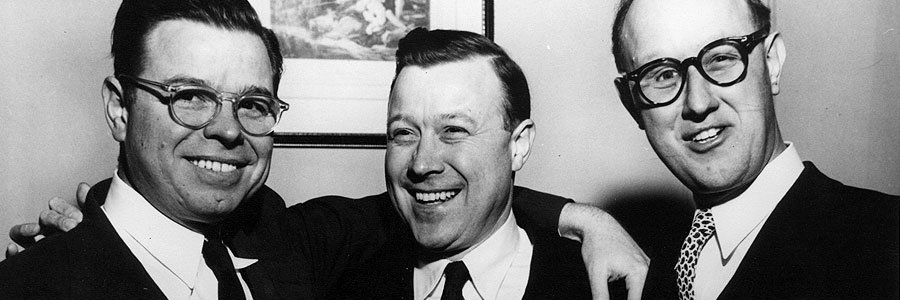
Brothers On The Line

BROTHERS ON THE LINE (MOVIE)
Porter Street Pictures
World premiere: March 8th, 2012 (Uptown/Detroit Independent Film Fest)
Running time: 80 minutes
Writer, director and co-producer: Sasha Reuther
Narrator: : Martin Sheen

With around 390,000 active members and more than 600,000 retired members in 750 local unions, the United Auto Workers union have negotiated 2,500 contracts with some 1,700 employers¹ and have been compelling American democracy to live up to its promise of equality since 1935. Yet the story of how it all came about is one that’s relatively unknown, until now.
Brothers On The Line begins in 2008, Detroit, Michigan. The camera pans across the abandoned factories and derelict buildings across the city, and Martin Sheen, as the narrator, tells us,
From there we then go back to the early days of the automobile industry, back to the beginning of the twentieth century. Labour historian Kevin Boyle tells us this industry didn’t exist in 1900 but by 1920 it was the dominant force in the American economy. By 1927, Detroit’s metal foundries, parts suppliers and manufacturers were employing over 300,000 workers – the equivalent to 1/5 of the city’s population.
One of these workers was 20-year-old Walter Reuther, a toolmaker from West Virginia who landed his first job with the Briggs Manufacturing Company. Via audio recording we hear Reuther talking about his time there and describing the place as a “real butcher shop”, meaning it was a gruelling environment; a place where you would only stay a short while before moving on to a decent job. He talks about having to work 13 hours a night and 21 nights in a row with only a 30 minute lunch break.
 Fleetwood Strike © Wayne State University Collection
Fleetwood Strike © Wayne State University CollectionPlant managers would drive workers to meet and exceed targets as much as possible, but then the Wall Street Crash of 1929 happened and Detroit, like everywhere else, plunged into the Great Depression.
It’s from here we start to learn about the role Walter and his two younger brothers Victor and Roy played in bringing about changes for workers in the auto industry by talking to them about standing up for their rights and organising a union.
 Victor Reuther © Wayne State University Collection
Victor Reuther © Wayne State University CollectionThe Reuthers were from a German socialist family and were raised with the idea of workers rights, something which they took to heart as adults. It became a driving force for them when they saw the exploitation of these workers and disregard for their rights by bosses whose primary concern was maximising profits whatever the costs.
Showing much dedication to their cause, the Reuthers went about recruiting union members at a time when it was dangerous to even wear a union button on the outside of your shirt. Still, those involved persevered and the United Auto Workers union was officially formed in 1935 after years of agitation within the labour federation. Their members have benefited from breakthroughs that included the first employer-paid health insurance plan for industrial workers, the first cost-of-living allowances and training and educational programs. ¹
The UAW were also leaders in the struggle to secure economic and social justice for all and were actively involved in every civil rights legislative battle since the 1950s, including the campaigns to pass the Civil Rights Act of 1964, the Voting Rights Act of 1965, the Fair Housing Act, the Civil Rights Restoration Act of 1988 and legislation to prohibit discrimination against women, the elderly and people with disabilities. ¹
- UAW ¹
Brothers On The Line is engaging from start to finish, outlining a slice of history, which until now, I knew little to nothing about. Bringing together UAW archive footage, photographs, audio recordings and interviews, Victor’s grandson Sasha Reuther tells an affecting personal story that’s also one of historical importance.
Had Walter Reuther not taken a stand to help others defend their rights as workers, I’m not sure who would’ve or if any of things the Reuthers and the UAW achieved would’ve eventually come to pass through someone else’s actions. It’s a moving, insightful and well put together documentary that anyone with an interest in history, civil rights and documentary filmmaking should see, if only to see how much of a difference a few can make for so many.

Patrick Samuel
The founder of Static Mass Emporium and one of its Editors in Chief is an emerging artist with a philosophy degree, working primarily with pastels and graphite pencils, but he also enjoys experimenting with water colours, acrylics, glass and oil paints.
Being on the autistic spectrum with Asperger’s Syndrome, he is stimulated by bold, contrasting colours, intricate details, multiple textures, and varying shades of light and dark. Patrick's work extends to sound and video, and when not drawing or painting, he can be found working on projects he shares online with his followers.
Patrick returned to drawing and painting after a prolonged break in December 2016 as part of his daily art therapy, and is now making the transition to being a full-time artist. As a spokesperson for autism awareness, he also gives talks and presentations on the benefits of creative therapy.
Static Mass is where he lives his passion for film and writing about it. A fan of film classics, documentaries and science fiction, Patrick prefers films with an impeccable way of storytelling that reflect on the human condition.
© 2022 STATIC MASS EMPORIUM . All Rights Reserved. Powered by METATEMPUS | creative.timeless.personal. | DISCLAIMER, TERMS & CONDITIONS
HOME | ABOUT | CONTACT | TWITTER | GOOGLE+ | FACEBOOK | TUMBLR | YOUTUBE | RSS FEED
CINEMA REVIEWS | BLU-RAY & DVD | THE EMPORIUM | DOCUMENTARIES | WORLD CINEMA | CULT MOVIES | INDIAN CINEMA | EARLY CINEMA
MOVIE CLASSICS | DECONSTRUCTING CINEMA | SOUNDTRACKS | INTERVIEWS | THE DIRECTOR’S CHAIR | JAPANESE CINEMA





